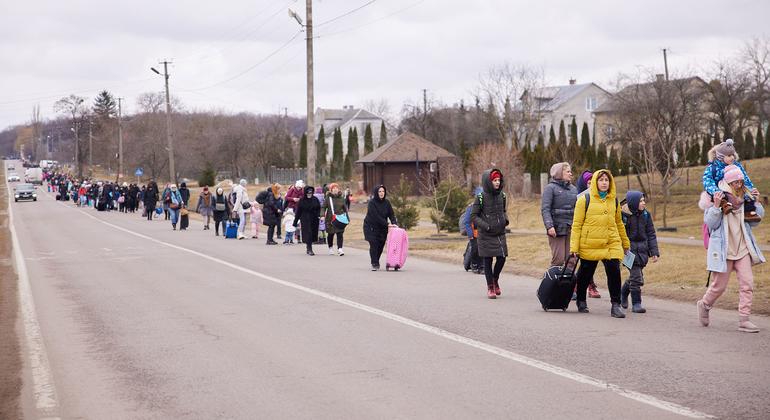Unaccompanied and separated children fleeing the conflict in Ukraine must be protected, two senior UN officials said in a joint statement on Monday.
Catherine Russell, Executive Director of the UN children’s agency, UNICEF, alongside the UN High Commissioner for Refugees, Filippo Grandi, urged countries taking in displaced Ukrainians to ensure these youngsters are immediately identified and registered.
“Children without parental care are at a heightened risk of violence, abuse and exploitation. When these children are moved across borders, the risks are multiplied.”@unicefchief and @FilippoGrandi on the situation for children fleeing escalating conflict in #Ukraine.
— UNICEF (@UNICEF) March 7, 2022
Young lives at risk
“Children without parental care are at a heightened risk of violence, abuse and exploitation. When these children are moved across borders, the risks are multiplied. The risk of trafficking also soars in emergencies,” they said.
More than 1.7 million people have fled Ukraine since the start of the Russian offensive nearly two weeks ago, according to data from the UN refugee agency, UNHCR, which Mr. Grandi heads.
The majority, more than one million, have gone to Poland, while others have headed to Hungary, Moldova, Romania, Slovakia and beyond.
Hundreds of thousands of children are among the refugees, including many who are unaccompanied or who have been separated from their parents or family members.
Expand emergency care
The UN agency chiefs said countries should offer safe spaces for children and families immediately following border crossings, and these sites should be linked to national child protection systems.
Given the current situation, the capacity of emergency care arrangements should also be expanded, they added. Screened caregivers should be in place, along with other services critical for protecting children, as well as mechanisms for family tracing and reunification.
Family reunification critical
“For children who have been displaced across borders without their families, temporary foster or other community-based care through a government system offers critical protection,” they said.
“Adoption should not occur during or immediately after emergencies. Every effort should be made to reunify children with their families, when possible, if such reunification is in their best interest.”
Meanwhile, nearly 100,000 children in Ukraine, half of them with disabilities, are living in institutional care and boarding schools. Many of these children have living relatives or legal guardians.
Protect children’s interests
With reports of institutions seeking to move children to safety in neighbouring countries or beyond, the UN agency chiefs underscored the critical need to ensure measures are taken in the best interest of the children, and that their parents or other persons responsible for them have granted consent.
“Under no circumstances should families be separated as a result of relocation or evacuation movements,” they said.
Evacuation of children in institutions in Ukraine must be done in line with instructions by national authorities, they added.
All movements across borders must be immediately reported to the competent authorities in the country and neighbouring States. Children should also be evacuated with their identification and case files, as far as possible.
While grateful for the solidarity and readiness shown by countries, the UN officials stressed that unaccompanied and separated children are particularly vulnerable.
Therefore, their immediate needs and safety must be prioritized in the short term while medium to long term solutions are identified.
